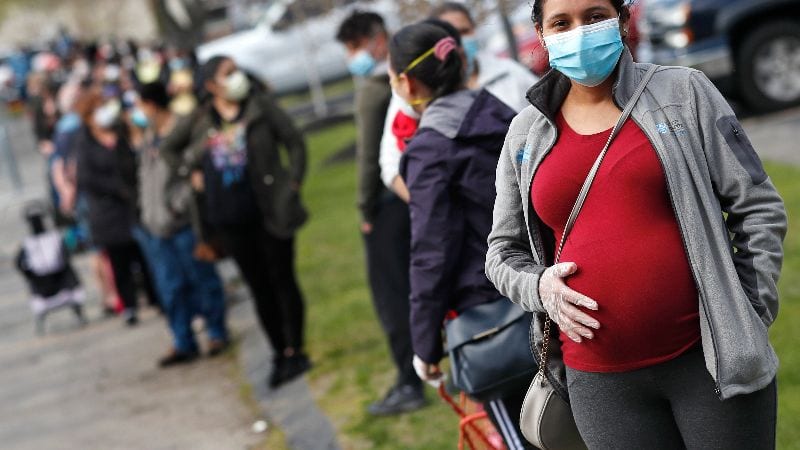This story was co-published with The Washington Post.
As Washington spends billions of dollars to fast-track a coronavirus vaccine, a number of medical researchers and Democrats are calling on Congress to guarantee that pregnant people are involved in federally supported trials — an inclusion that is not guaranteed though research shows they could be particularly vulnerable to the coronavirus.
Of the six pharma companies with government contracts to develop a vaccine, four — Pfizer, Johnson & Johnson, AstraZeneca and Novavax — have not included or do not plan to include pregnant people in their early- or mid-stage (Phase 1 and 2) trials according to records published by the U.S. National Library of Medicine. Moderna announced Tuesday that it is excluding pregnant people from late-stage “Phase 3” trials. The sixth company, Merck & Co., has not begun clinical trials and has not decided whether to include pregnant people, a spokesperson said.
The federal Food and Drug Administration typically recommends drugmakers include pregnant people once they reach larger Phase 3 trials, some of which are set to launch later this summer. For coronavirus specifically, the agency has advised that vaccine makers at least consider including pregnant people in their trials.
AstraZeneca would not answer whether pregnant people will be included in Phase 3 trials. Pfizer, Johnson & Johnson, Moderna and Novavax did not respond to requests for comment.
New data from the Centers for Disease Control and Prevention suggests that pregnant people who contract COVID-19, the disease caused by the coronavirus, appear to have a 50 percent greater chance of entering intensive hospital care because of the virus and a 70 percent greater chance of being put on a ventilator. The CDC data is preliminary, but “it emphasizes even more the importance of ensuring that pregnant women can get a vaccine,” said Sonja Rasmussen, a professor of pediatrics and epidemiology at the University of Florida who worked at the CDC for 20 years. “That means it has to be studied in them.”
But experts are still debating when and how to do that safely. In an op-ed published in the medical journal JAMA, public health researchers from Harvard, Johns Hopkins and Georgetown argued that vaccines should be studied in pregnant people “as soon as feasible after vaccine safety is established,” potentially after Phase 3 trials. Other researchers argued that pregnant people should be considered earlier — and that some more advanced vaccine candidates, like Moderna’s, should already be including them.
Sen. Elizabeth Warren (D-Mass.) is drafting legislation that would require any approved vaccine to also work for pregnant people, an aide confirmed. In a March letter to the National Institutes of Health and the FDA, Warren and Sen. Patty Murray (D-Wash.) called on both agencies to “use their authorities to incentivize and ensure the development of vaccine and treatment candidates suitable for use in pregnancy.”
At a Senate hearing this month, NIH Director Francis Collins called inclusion of pregnant people a “high priority” and said that NIH is working to compile “additional research efforts” to improve outreach.
The left-leaning Center for American Progress, in a report shared first with The 19th, has put out its own set of recommendations for policymakers to ensure government-funded research includes non-White women, nonbinary people, transgender people and pregnant people.
The recommendations include collecting more robust data on how the virus affects different demographic groups, legislation mandating clinical trial diversity in federally funded research, and FDA standards requiring that drug trial data include information on how new pharmaceuticals affect pregnant people.
It also advises shifting the current U.S. vaccine policy that researchers must get consent from both parents of the fetus before enrolling pregnant people in clinical trials if the research is expected only to benefit the fetus, a standard the authors argue prevents pregnant people from enrolling in trials. The report’s authors argue that researchers must work to actively recruit pregnant people and have trials run by people knowledgeable about obstetrics.
“If women’s health needs are not adequately considered, therapies could prove ineffective, or even harmful, for women — and antithetical to the goal of stopping the spread of the virus,” the report reads.
Geeta Swamy, an OB/GYN and vice president for research at Duke University, argued that it’s time for some of the more advanced vaccine candidates — such as Moderna’s, which is entering Phase 3 trials July 27 — to be studied even in a small group of pregnant people. Typically, she added, the federal government would spearhead that kind of effort. The government’s absence, she said, “is a real problem.”
Pregnant people aren’t typically included in major vaccine trials, in part because of concerns that the people and their fetuses might be at heightened risk of complications. The consensus on putting pregnant people in clinical trials has started to shift, medical researchers said, in part because of their exclusion from testing for Ebola vaccines. In the past five years, a new argument has begun to take hold: Leaving pregnant people out of vaccine trials puts them at greater risk.
During the Ebola crisis, despite having a much higher fatality rate, pregnant people weren’t initially eligible for experimental immunizations. In some outbreaks, more than 90 percent of pregnant people who contracted the virus died, as did almost all fetuses and newborns.
“Pregnant women who become infected with Ebola — it’s basically a death sentence for them and their babies,” said Anne Lyerly, an obstetrician and bioethicist at the University of North Carolina-Chapel Hill’s department of social medicine. “There’s this great poignant phrase that ‘they were being protected to death.’”
As new information emerges about the virus’s relationship to pregnancy, the calculation could change, said Ruth Faden, a bioethicist at Johns Hopkins University who focuses on immunizations for pregnant people. For instance, if there is more evidence linking pregnancy to covid-19 complications, that would strengthen an argument for testing pregnant people earlier.
“The only way to get vaccines that pregnant women can comfortably take is by gathering evidence during the research and development process,” Faden said.
It’s possible that including pregnant people, who are considered a “special population,” could slow down the vaccine trials. But health advocates argue that’s a risk worth taking. “We do need a vaccine,” said Jamille Fields Allsbrook, one of the report’s authors and CAP’s director of women’s health and rights. “We want to make sure it’s equitable for everyone.”






